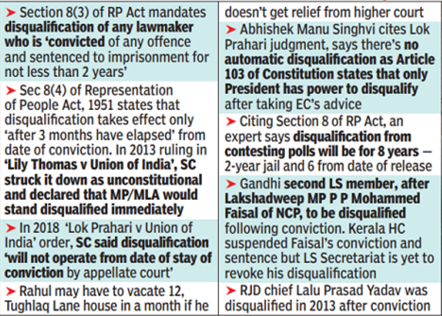

25th March 2023 (11 Topics)
Context
Wayanad MP Rahul Gandhi’s membership of India’s lower house of Parliament, the Lok Sabha, has been cancelled following his conviction and sentencing by a local court in Surat.
What are the important rules pertaining to ‘disqualification’?
- The law under which Rahul Gandhi has been disqualified is the Representation of People Act, 1951.
- Section 8(3) of the Representation of the People Act, 1951 states that “a person convicted of any offence and sentenced to imprisonment for not less than two years shall be disqualified from the date of such conviction and shall continue to be disqualified for a further period of six years since his release.”
- Disqualification under Section 8 of the Representation of the People Act, 1951 is enabled by Article 102 (1) of the Constitution of India.

|
Grounds of disqualification
|
Way forward
- The Supreme Court in its ruling in Lok Prahari v Union of India (2018) clarified that a disqualification triggered by a conviction will be reversed if the conviction is stayed by a court.


